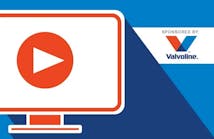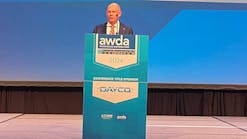Part 1 of this series debuted online in September at AftermarketBusiness.com/DeemedEssential; part 2 aired in October and can be viewed at AftermarketBusiness.com/DeemedEssential2; and part 3 was released last month at AftermarketBusiness.com/DeemedEssential3. They introduced us to four shop owners:Kyle Logue, Essex County Repair in Middleton, Mass; Amy Mattinat, Auto Craftsmen in Montpelier, Vt.; David Roman, Done with Care Auto Repair, Kansas City, Kan.; and Lucas Underwood, L&N Performance Auto Care, Blowing Rock, NC.
Social justice rallied by the Black Lives Matter demonstrations around the police murder of George Floyd — or any politically charged event — isn’t at the top of mind for David Roman. But he drew a causal relationship when the local government loosened the city lockdown. “Once the restrictions lifted,” quipped Roman, “everyone in Kansas City moved on with their lives. At first, they practiced caution and paid attention to what they were doing.”
Hesitantly Roman chuckled. “When the media latched onto the race riots, it’s like the city forgot about the health rules.” One of the frontline technicians let down his guard just the other evening and broke his leg. What happened, Roman grumbled, is that at the height of an evening drinking bender, the tech hopped on his motorcycle at 11 p.m. and collided into the highway guardrail. Police charged the tech with drunk driving as the ambulance wheels him away to the hospital emergency room.
Next, Done with Care Auto Care was finished with the tech. Roman fumed at this avoidable accident that coincided with a dramatic rise in bookings. “I had worked my tail off just to reach thirty vehicles,” barked Roman. The digital and postcard mailings were finally attracting new customers, and then the shop must adjust with two installers to perform the output of three. “Now, we have to deal with high customer expectations!”
It’s almost Independence Day, and Roman put on a verbal fireworks display. The state of Kansas reevaluated the severity of virus cases in the region, mandating that the population wear face coverings. “This is lockdown 2.0! I’m not gonna wear a mask. It’s the stupidity of the government to mask up!”
Personal feelings aside on his views on herd immunity, Roman brought up the safety and protection of his customers. He cannot risk any missteps of alienating the business relationship with the public. Even though the reception area is still open, Roman instructed the staff to encourage the customers to stick with the contactless interaction. All employees must redouble their sanitization protocols from wiping any object they touch down to the car keys that the customers leave in the deposit box.
A new tech replaced the one who began to receive unemployment benefits from the termination. Roman explained that his business bears responsibility for the next nine months and had considered bringing the offender back. Still, as Roman weighed the benefits, he refused to accommodate this “useless individual.” He expected that productivity will rise and bring the company to a V-shaped recovery. Back in January, Roman explained that he had planned on buying a larger building, and when the pandemic goes away, he hopes to hit the reset button. Meanwhile, he maintained a disciplined schedule of discharging the finished cars and trucks off the rack on time.
Visit sidelined
Initially, Logue and I didn’t speak during our final session to discuss where Essex County Repair goes next. I admired the wall covering of advanced diagnostics certifications in the barren waiting room. A distant voice broke the silence.
“Chris, you cannot do a soft approach. You’re going to have to use a harder approach,” Logue impatiently said to his newly hired service advisor. They deliberated about how they were going to break the bad news to their customer. Her Toyota Corolla won’t be ready by 5 p.m. unless the local suppliers could produce a manifold that same day.
Hastily Logue bolted into the service bay. Ten minutes pass as Chris Melio scans the electronic catalog for the proper manifold. Politely Melio flashed a smile and explained, “It’s been a crazy week for our shop!” Melio mentioned that a string of people had complained that their vehicles had issues starting up, a result of parasitic drawdown on the battery. Finding replacement batteries overall had been much more accessible than tracking down manifolds. Still, I hear rumors that the area part stores had been struggling to rebuild their inventories because their vendors are catching up with larger orders. Melio knew that online sites were an option at the sacrifice of a longer wait time.
Another five minutes lapsed. The landline rang continuously, and Logue’s cell buzzes. Our conversation about the future of Essex County Repair had technically ended, the answer to my question appeared self-evident that this place was in high demand. In between trotting back and forth from a brake job to the shop management software system, Logue excused himself for being a poor host and wanted to reschedule. “Normally Friday afternoons are quiet around here,” chuckled Logue. What I saw were four people thrown into triage mode.
Logue invited me to observe the unfolding action. Nine intakes appeared on the monitor. Some cars were waiting for parts, others were a work in progress, and a few are complete. All the same, the customers received an update as I snuck a glance at the software-generated text message that read, “Hi Beata, your car is ready. Here is a link to review your invoice and pay online.”
In other cases, explained Melio, when routine maintenance ends up in underlying complications, he’ll place a phone call to the customer. All preexisting conditions undergo digital photographic documentation. Melio said that someone neglected to replenish the brake fluid reservoir. He shot off an image taken by the tech of an empty container and the matching label warning of contaminants. Melio’s text message stated, “Hi Jim, this is a link to your vehicle health assessment.”
From Essex County’s perspective, where Massachusetts was one of the last to reopen in the nation, the mood felt surreal. Few people wore face masks. Across from Logue’s grey low-slung building, I stared at the driving range teeming with golfers happily striking their little white balls onto the fairway. I peered backward through the reception door window, and the two mechanics craned their necks into the engine. They fastened the rubber belt onto the pulley.
Visible signs of a slowdown from the virus or the economy seemed harder to decipher in Logue’s world than one hour ago. Our visit ended. Loge apologized and promised that we’d meet again once the appointments stabilize. I pulled down my worn mask to thank him, we bumped fists and tapped elbows, until the next encounter.
Essentially independent
Together we wound down our contactless interview on a sweltering mid-July afternoon in Montpelier, Vt. Sipping lemonade under the canopy that substitutes as the indoor waiting room, Amy Mattinat appraised month five into the pandemic. Profits were as healthy as ever. Staffing levels were back at full strength. Grayson, who took over Nikki’s service advisor position, had mastered the fundamentals that allow Mattinat to scale back her 12-hour days. Steadily, but inexplicably, appointments filled the calendar while traffic count remains stubbornly low for this time of year.
“People are definitely not driving as much. So, when they come in for an oil change, we’re now looking at the last time that real work was done,” said Mattinat. Overextended periods when the engine isn’t turning gears, chemicals are breaking apart, which requires flushing out of the fluids, remarked Mattinat. Apart from chassis and brake systems replacements, and a slew of Vermont state inspections, Mattinat said, “we had tons of weird stuff come in like a defective BMW yaw rate sensor and other bigger jobs.” The local Sanel NAPA dealer that she uses for supply chain support has been attentive, despite their skeleton crews and periodic inventory shortages. Sourcing European parts remains tricky, but her solution is that she and Sanel NAPA develop a partnership.
Mattinat’s grin slackened. Her eyes traced one of the ropes lashed down by one of the used brake rotors that hold the canopy snug. More unfinished tasks lie ahead for Auto Craftsmen. She predicted that this marathon pandemic will carry into 2021. How will the community hold up if the government shuts off funding for workers and businesses?
True to Mattinat’s unofficial capacity as a critical service in one of the nation’s more rural cities that lacks public transportation, she told me that people in her community can pull back on their expenses only so far because of limited substitutes. Her role in bridging that gap is to ensure that each vehicle she treats becomes more roadworthy than before, except when the health is beyond repair and buying another car makes sense.
Either way, whether it’s about healthcare or car care, the customer’s interests come first. She prayed that the installers in Arizona and California who are currently enduring the damaging effects of COVID-19 are taking the safety guidelines as seriously as Auto Craftsmen.
Initially, Mattinat hesitated to advise her industry peers, rationalizing that independent operators like her must decide which protective measures best fit their environments. Momentarily, her smile brightened as she credits the fraternal bond with automotive installers. “Shop owners are working hard, and you know for what? To keep the roads safe. Shops are an essential business.”
Just slightly, I nudged Mattinat to comment on whether her peers are doing enough to protect themselves and their stakeholders. “Unless someone asks for advice, they’re already have made up their mind. So instead of it becoming a conversation about protecting people versus individual freedoms, it gets ugly. I’m staying out of that!”
Something changed her mind about what to do if the resurgent pandemic were to overwhelm the economy. “I also feel that the information is out there of what you should be doing to protect your livelihood. And as a boss, it’s your job to do the research and make smart decisions to protect your workers and people who make physical contact with them. Think about what independence means and why shop owners are independent for a reason.”
Open ended
A golden path painted in the shape of cobblestones bends around the Auto Craftsmen structure. Its endpoint unceremoniously meets the restroom. Whatever inspired Mattinat to add this tongue-in-cheek Yellow Brick Road theme years ago triggered questions about the open road that stretches ahead for Mattinat, Underwood, Roman and Logue.
How much longer can they hold on? How will their communities react if the state governments order a second lockdown to curtail the virus? July unemployment claims spiked again as virus cases surpassed the 4 million mark. And consider the economic uncertainty, the financial experts warn, after the enhanced benefits for the unemployed expire.
Feeling less anxiety and strangely relaxed about the specter of a financial freefall that could halt consumer spending, Mattinat sighed, “I feel balanced.” There’s only so much news that she can digest. She reminded me that she has finally rebuilt her savings for another setback. Through 2020, she’s suspended all travel, plus trade shows. “You couldn’t pay me to go. I feel horrible about it because I haven’t missed AAPEX and SEMA in 10 years.”
While Mattinat awaits a vaccine, she plans to enhance the digital services and contactless practices to include an outdoor breezeway attached to the car key dropbox. Without a fixed marker in view on her symbolic yellow brick road, Mattinat and her team commit to one open-ended quest: “What must be done, and what can we do about it?”
Gradually communications between the other shop bosses and me wane. I’m only left to speculate why Kyle Logue went radio silent. No follow-up emails or text messages have appeared. Perhaps he and his young family have taken more weekend escapes to his favorite campgrounds in Maine.
The latest update on David Roman came from what his customers wrote about Done with Care Auto Repair. One critical review over Google drew Roman’s open apology to communicate better with that individual. But nearly the rest of the customer feedback rates Roman four stars for the staff’s transparency amid the inconveniences that everyone has encountered.
Consistent with L&N Performance’s evolving identity, Lucas Underwood and his auto diagnostician appear on a short video clip on LinkedIn. The mechanic twirls a rusted brake rotor under one hand and a shiny unit under the other palm — the face-covering droops from his neck. The dialogue and visual props strike a competing message between stopping safety and personal safety.
Separate yet equal, both ideals are the cost of running an automotive service center. And it remains a work in progress. No one forced them to innovate. They adjusted. Society didn’t require them to adopt new technologies to make themselves more accessible to their customers. They pivoted. Imperfect with their improvisations, but determined to perfect their vision of a deemed essential business, Mattinat, Underwood, Logue and Roman could be onto to a notable transformation.



